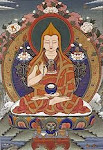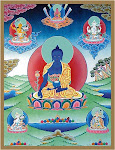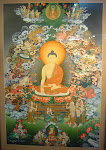Think, "If I were now in the lower realms, in the hot or cold hells, in the preta realm or in the animal realm, my suffering would be far greater. The hunger and thirst of the preta realm is thousands of times greater that that of the human realm. Let alone the major hot and cold hells, if I were born now in a neighboring hell or even an ordinary hell realm, my suffering would be unbelievable."
We can't bear to put our finger in boiling hot water; but compared to being born in the neighboring hell where there are oceans of lava, the boiling hot water of the human realm is extremely cold. Imagine suddenly being in such a hell.
Death can happen any day, any hour, any moment—even this moment. And what comes after death is the lower realms. As Nagarjuna advises, we should remember the unbearable sufferings of the lower realms.
The cause of rebirth in the lower realms is negative karma, or nonvirtuous action, and any activity we do with a motivation of attachment clinging to this life is a nonvirtue. For example, if we got dressed today with a motivation of attachment clinging to this life, that action of dressing became nonvirtuous because our motivation was nonvirtuous. What was our motivation when we were washing? For many of us, it was simply attachment clinging to the happiness and comfort of this life, so again that washing became negative karma. It was the same when we ate lunch and dinner, and it will be the same when we go to sleep. With any activity we do, if we analyze our motivation for doing it, we find it is nonvirtuous, attachment clinging to this life, so all those activities become negative karma.
Negative karma is very extensive. It's not limited to just the ten nonvirtuous actions, but within the ten nonvirtuous actions are those nonvirtues that we collect many times every day—though we mightn't kill or steal. However, His Holiness Ling Rinpoche once made the comment that the subject of stealing is extensive and detailed. It depends on the individual person, but we generally commit many of the ten nonvirtues many times in one day. We also break the vows we have taken: pratimoksha vows, lay or ordained; bodhisattva vows; tantric vows. This is talking about just today. The negative karmas we have created from the time of our birth in this life are unimaginable, and then there are all the negative karmas we have created in beginningless past lives.
In his lam-rim teachings, Pabongka Dechen Nyingpo says that an ordained person being careless about and not immediately confessing a downfall is heavier negative karma than having killed one hundred human beings and one hundred horses. (I don’t think it has to be only horses—it can be any animal. In the past in Tibet they used horses a lot as there were no cars.) If you have taken ordination and are intentionally careless about your vows, this is how heavy the karma that you create is.
When you think of how death can happen at any time and of the lower realms, in relation to karma, you can't ignore it. You have to get up and practice. You can't stand it. You've got to do something immediately; you've got to purify, collect merit, meditate on the path.
It is also very useful to think about people you know who have died, like Andrea [Antonietti], the Italian monk. On my advice, he took ordination for a second time and died as a monk. Many of us here, those who have been here in Bodhgaya and in Dharamsala many times, will remember Andrea. He was an old student, an Italian, who was a monk before. He then changed his life, but before he died, while he was sick, he again took ordination. Now he's gone. He doesn't exist. There's no Andrea. Before there was Andrea, but now there's not. Before we used to joke and play with him and enjoy his humble, good personality, but now he doesn't exist. Think, "It is the same with me. There will come a time when I don't exist any more, a time when I'm not here in this world. This could happen at any time. By this time next year, I could be the same as Andrea, whom we can't see, who doesn't exist in this world. This could happen. By this time next year, I could be like that—not to be seen in this world. Some people have Andrea's malas and other possessions; the same thing could happen to me. Any day this could happen to me."
There was also another Italian, Stefano [Piovella]. He was a monk before, but he wasn't a monk when he died. It is the same. We used to joke and play with him, making fun of him all the time, but now he's not here. Now he's not here in this world. Think, "Exactly the same thing could happen to me at any time. I could be gone from this world. I won't exist. This could happen at any time."
There was also Tenzin Konchog, the nun who was here making tsa-tsas about five years ago. She was the main person responsible for making tsa-tsas. A few years ago she was here, in Bodhgaya, but now she is not here. She's gone. Think, "Exactly the same thing could happen to me any time, any day. I will not be here. There's a time when I will be gone from this world. I won't exist. This could happen any day."
Your body could be carried to the cemetery or the crematorium. Any day this could happen. You could suddenly have a heart attack or a stroke. Something could suddenly happen, and the time of your death come. Your precious human life would be gone.
If you had done continual strong practice of purification, practiced morality well, lived your life with bodhicitta and correctly devoted yourself to the virtuous friend, you would have no regrets. Even if some sickness came and your death happened, it wouldn't disturb you. It wouldn't upset you at all. You would be very happy, as you would feel completely confident that you would go to a pure land or receive a perfect human body in your next life. Your mind would be happy, or at least you would have no fear. Even if death suddenly came to you, you would not be frightened of being born in the lower realms.
If we really bring our attention inside, if we really think about the nature of our life, impermanence and death, we realize that our death could happen at any time and, in particular, all the unimaginable sufferings of the lower realms could happen at any time. Relate this to all the negative karmas you do—in one day there are so many, like rainfall. Committing one complete nonvirtuous action has four suffering results. One of them is creating the result similar to the cause, which means doing that action again, which again produces four suffering results, one of which is creating the result similar to the cause, so you commit the action again.... It goes on and on in this way. Committing one complete nonvirtuous action, from the ten nonvirtuous actions, produces suffering results that go on and on and on, so that there is unending suffering of samsara.
We've done so many of the ten nonvirtuous actions in this life, since our birth, and so many others during beginningless rebirths. The results of them will go on and on in that way. There are numberless of them left on our mental continuum that we haven't purified and that we haven't finished experiencing.
Since committing even one negative karma from the ten brings this endless ongoing suffering, you can't stand it. You have to get rid of it, purify it, immediately. It's as if you have swallowed some poison and could die at any time. It's as if a poisonous snake has bitten you: the poison is spreading and you could die at any time. But ingesting poison or being bitten by a poisonous snake is nothing. That alone can’t make you be reborn in the lower realms, but your negative karma can.
I've been talking about just one negative karma, but we have created so many negative karmas today, in this life and during beginningless past lives. There's no way you can stand it—you have to purify it all right away! And at this time, by having received this perfect human body, you have all the opportunities to purify it. If death comes before you have purified your negative karma, you are finished. When will you meet Dharma again? When will you be able to purify all those negative karmas? When will you be able to actualize the path? It is extremely difficult to say.
Now, on top of having committed the ten nonvirtuous actions and degenerated or broken all three levels of vows, you have collected negative karma in relation to the guru. Even the smallest of these negative karmas is very powerful, and you have created so many with heresy, anger and other negative thoughts. These negative karmas are much heavier than all those others.
In the lam-rim outline of the shortcomings of having made mistakes in correctly devoting to the guru, the first shortcoming is that criticizing the guru is like criticizing all the buddhas.
Second, if you get angry with your guru, you destroy eons of merit equal in number to the moments of your anger, and for the same number of eons you will be reborn in hell and experience suffering.
Third, even though you practice tantra, you won't achieve the sublime realization.
Fourth, even though you attempt to practice tantra, it will be like achieving hell. Even though you practice tantra for many years by not sleeping, not eating, not talking and living alone in a cave, it will be like achieving hell. Why? Here you have to understand that when you make a mistake in devoting to the virtuous friend—even showing some small disrespect, criticizing them, harming them or giving rise to negative thoughts—it is so heavy that even though you are practicing virtue and collecting merit by doing retreat sessions, it is very small compared to the heavy negative karma you have collected in relation to the virtuous friend. That negative karma is so huge that any virtue you practice by reciting mantras and so forth becomes insignificant. The negative karma is overwhelming, and you are reborn in the hell realm. This is what happens unless you change your mind, stop following those negative thoughts, recognize the mistakes you have made, confess them to the guru and purify them. By using logical reasoning and the quotations from Shakyamuni Buddha and Vajradhara, you have to transform your mind into devotion by seeing the guru as a buddha.
It doesn't mean that you have no hope—it's not saying that. There's hope, if you change, if you recognize the mistakes you have made and, with strong regret, confess and purify them. In order not to commit the mistakes again, you then have to keep your mind in devotion toward that guru. You can change; it's not saying you can't change. But if you don't change, no matter what practice you do—many years of chanting mantras in retreat with no food and no sleep—even though you may be collecting merit, it will be insignificant compared to the heaviness of the negative karma you have created. Even though you attempt to practice tantra, it will be like achieving hell. As long as you don’t change, it will be like achieving hell. Instead of achieving enlightenment, you’ll be achieving hell, because that karma is so heavy.
What I am saying is that there's no time to be lazy. Reflect on the negative karmas you have collected and the sufferings of the lower realms, and remember that this is the only chance you have. If you cherish yourself, if you love yourself, this is what you have to do. If you want to take care of yourself, this is the practice you need to do. If you think about this, there's no time for laziness, no time to be distracted by the appearances of this life or works for this life.
As mentioned in the motivation for taking the Eight Mahayana Precepts by my root guru, His Holiness Trijang Rinpoche*, which is similar to the motivation for taking refuge in Jorchö, if you think of all the endless sufferings of samsara that you will have to experience, particularly those of the lower realms, you don’t dare to eat or sleep. When you're very frightened, you can't eat, or even if you do manage to eat, you vomit. If you think of all the past beginningless sufferings of samsara, in particular those of the three lower realms, it's something that cracks your heart. It's very frightening.
Here The Bodhisattva’s Jewel Garland says:
Thoroughly abandon sleep, drowsiness and laziness.
Always attempt to have perseverance.
Of course, it's not saying not to sleep at all at night. There is sleeping yoga. I heard that His Holiness Chogye Trichen Rinpoche sleeps for only two or three hours, and sometimes only one hour. During the daytime he gives initiations and teachings, then does his own practice for many hours. Also, I think His Holiness the Dalai Lama gets up around three o'clock in the morning. Peljor-la, His Holiness's attendant, offers tea around 3:30, then His Holiness begins his practice. Of course, Compassion Buddha doesn't need to practice....
As mentioned in The Great Treatise on the Stages of the Path to Enlightenment, in the middle part of the night you do sleeping yoga, then you wake up very early in the morning and practice. My sleeping is at the wrong time, the totally wrong time. When it's time to practice, I'm sleeping.
With remembrance, awareness and conscientiousness,
Always protect the doors of your senses.
Three times day and night, again and again,
Examine your mental continuum.
You have to protect your body, speech and mind from engaging in negative actions. As mentioned, three times in the daytime and three times at night, you should examine your mental continuum.
Lama Zopa Rinpoche gave this teaching at Root Institute Bodhgaya, India, 30 December 2003. Edited from the Lama Yeshe Wisdom Archive by Ven Ailsa Cameron and soon to be published in Kadampa Teachings, a free book from the Archive.























